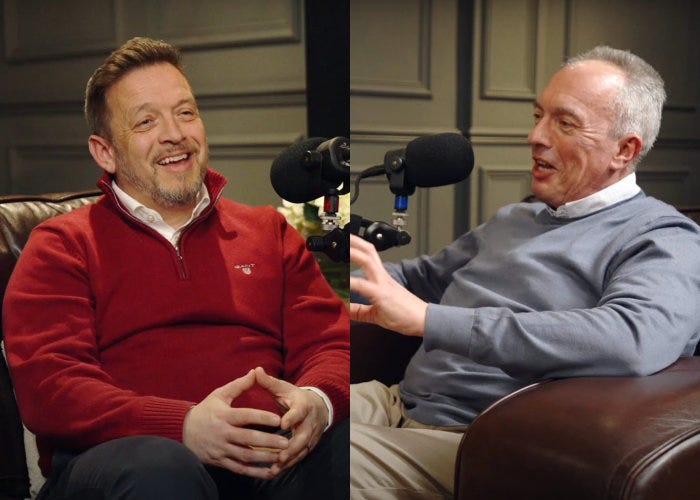Listen Up!
Unpacking a wide-ranging conversation with Harkn CEO David Bellamy
“When people talk, listen completely. Most people never listen.” — Ernest Hemingway 1
I recently sat down for a couple of hours with David Bellamy, CEO of real-time employee voice and wellbeing platform Harkn. 2
We had a great conversation covering a range of topics related to contemporary organisational life, how things have changed over the past 40 years or so, and how organisations can become fit for an increasingly uncertain and unpredictable future.
The production standards of the recording are exceptional, but recognising that not everyone will find the time to listen to the whole conversation, I’ve highlighted some main topics below.
Clicking on the time stamp links on the left will take you directly to that section of the recording.
00:00 Intro by David to the Harkn podcast “Listen Up!”
01:49 My interest in how things work and how they can be made to work better began at an early age — taking things like a family heirloom clock and the vacuum cleaner apart and getting in trouble for being unable to put them back together again…
05:48 The shift in focus from technology to people and how to create future-fit cultures of innovation, agility, and adaptiveness.
07:40 An accidental insight — the worst thing you can possibly do when you want to bring about major culture change in an organisation...
09:30 Big Consulting — what is it good for? The answer isn’t “absolutely nothing”. 3
10:45 Where Big Consulting went wrong — offering services they can’t deliver — now highlighted by Mariana Mazzucato’s exposé in her recent book “The Big Con — How the Consulting Industry Weakens our Businesses, Infantilizes our Governments and Warps our Economies”.4
13:20 Clients mostly hired me after they’d directly experienced Big Con help to actually be a hindrance.
15:43 Getting involved early on in the Organisation Learning movement.
16:45 Working with colleagues in Arthur D. Little’s Technology and Innovation Management practice.
18:53 Arthur D. Little’s acquisition of Peter Senge’s firm Innovation Associates.
21:20 The nature of organisational learning and learning organisations.
26:50 How careers have changed over the past 40 years.
32:05 The legacy of strategic planning and why high-tech firms were always more innovative, agile, and adaptive.
34:32 The Japanese Miracle and the emergence of organisational culture as a thing.
37:36 How life is different for young people joining organisations today.
44:12 What is innovation — “solving problems” or “creating value”?
47:23 The people who see the future are rarely in senior positions.
50:20 The value of listening to people in real-time.
53:07 Leadership is collective, and it’s learned on the job — not on courses.
58:00 The anachronistic emphasis on “leadership vision”.
1:03:03 Why the idea of flat organisations and getting rid of hierarchy is misguided — a key lesson learned in the feminist movement more than 50 years ago. 5
1:04:47 The necessary nature of hierarchy in future-fit organisations.
1:08:53 How The Enlightenment put us on the path to today’s imbalanced approach to solving problems and creating value.
1:13:53 David asks for my “three things to focus on”.
1:16:45 Culture is experienced as the way “we” do things “round here” — where both “we” and “round here” are experienced as dynamic, complex, and adaptive. And how the historical focus on Cultural Fit must be replaced with a future focus on Cultural Fitness.
1:20:00 How the Toxic Myth of “Culture as Shared Values” came about. 6
1:29:35 Why values in individuals matter so much, and how this helped sell the myth of “shared values” in organisations.
1:34:53 How culture is “the secret everyone already knows”. 7
1:37:15 The seven signalling channels through which people consciously and unconsciously influence and infer organisational culture. 8
1:43:30 Why performance management systems encourage mediocrity and, as Peter Drucker pointed out decades ago, the last thing organisations need is “well rounded” individuals.
1:47:40 “Moaners” and why people see things differently.
1:50:33 The 2D3D mindset at the heart of a future-fit culture of innovation, agility, and adaptiveness. 9
1:53:50 Why the truism “none of us is a smart as all of us” remains more rhetoric than reality.
1:57:36 What I like about Harkn’s philosophy given the adverse potential for employee feedback platforms.
2:02:00 David’s “playful” question: What would I change if I had a magic wand?
In Hemingway’s letter of advice to a young writer, reported in Malcolm Cowley, “Mister Papa”, LIFE magazine (January 10, 1949), Volume 26, No. 2, p. 90.
A nod to Edwin Starr’s June 1970 classic hit: “War — what is it good for? Absolutely nothing.”
See The Tyranny of Structurelessness by feminist icon Jo Freeman.
For more detail see the article: The toxic myth of 'culture as shared values'.
For more detail see the article: The secret everyone already knows.
For more detail see the article: The seven channels of culture.
See this previous piece on Unlocking the innovative mindset.



